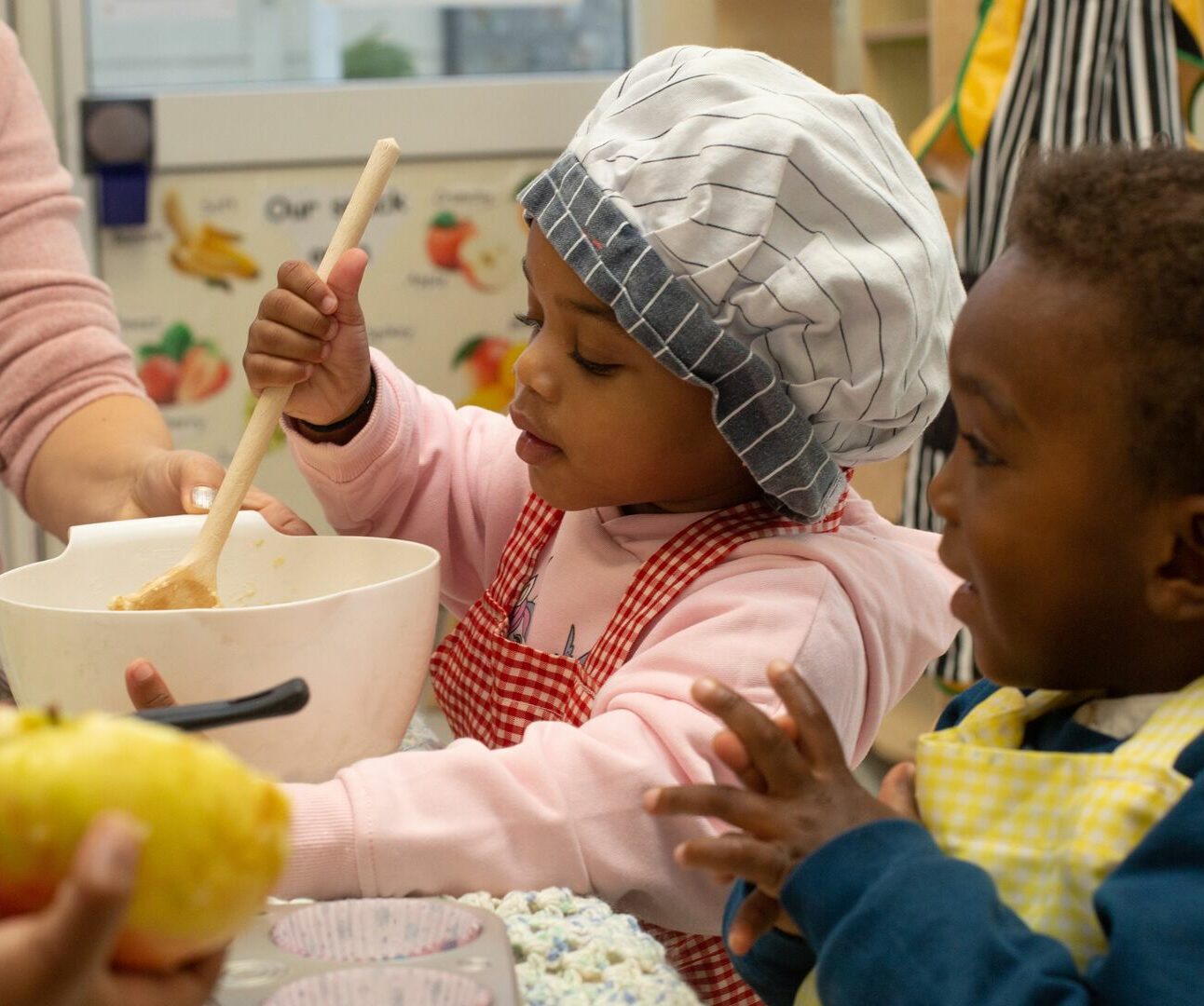
Talking Early Years: In converation with Catherine Lippe
Why Nursery Chefs Are Our Unsung Food Champions We talk endlessly about phonics, play, and pedagogy in Early Years — but how often do we talk about peas, pulses,…
May 21st 2025

The recent legal challenge to the Early Years in February, was the Department of Education restating the existing inflexible guidance confirming that settings cannot charge for ‘consumables’, including food. This may mean that more parents want to bring packed lunches into the settings. I am deeply concerned about this as it opens up all sorts of health and safety and nutritional issues including:
My instinct is to refuse to accept packed lunches on the ground that we have no control over the consequences. Currently, at LEYF we provide the children with a balanced diet of fresh, healthy and seasonal food, cooked by our chefs who have completed our pioneering Level 3 Award, so they learn about childhood nutrition, allergy management and encouraging children to eat well.
Our policy is that no food is brought in from outside our nurseries because we take our duty to ensure the safety of every child in our care very seriously. Food hygiene standards are followed, including:
Furthermore, we cannot monitor how home food is prepared or stored, making it difficult to guarantee safe handling and hygiene. Allowing food from home or other sources increases the risk of food allergies, (e.g. dairy, nuts, egg), cross-contamination, and choking hazards from unsuitable foods.
Of course, I am not asking everyone to do this. Some settings are small and niche and may have always used packed lunches and others may use them to address specific needs of children. I just want the right to say no!
So let me unpack my rationale using my SANFE criteria and then I need your opinions!

| Issue | Evidence | Risk |
| Storage
|
All Early Years settings in the UK are required to follow strict food hygiene and safety standards, including those set by the Food Standards Agency (FSA, 2023).
Refrigerators must be below 5°C; freezers at -18°C or lower. Raw and cooked foods must be stored separately to avoid cross-contamination. Dry goods should be kept in clean, dry, pest-free areas. One key requirement is that food must be thoroughly cooked to a core temperature of at least 63°C before chilling, to minimise the risk of harmful bacteria surviving and multiplying. Improper storage and handling of food can lead to contamination by pathogens such as Salmonella, E. coli, and Listeria, all of which can cause serious foodborne illnesses (NHS, 2021). To prevent cross-contamination, it is essential to store raw and cooked foods separately and to maintain perishable items like meat and dairy at safe temperatures in a fridge (below 5°C) or freezer (below -18°C) (FSA, 2023). At our nurseries, we cannot offer additional refrigeration for food brought from home, nor can we store external food in our existing fridges. Doing so would increase the risk of cross-contamination, compromising the health and safety of all children. Moreover, managing and storing different foods for each child is logistically complex and places an unnecessary burden on staff. It diverts attention from their primary responsibility—delivering high-quality care and education—and increases the potential for error, including allergen exposure or unsafe food handling. |
Cross-contamination is one of the most common causes of food poisoning, therefore it is essential that work areas, surfaces and equipment used for raw and ready-to-eat food are adequately separated. We also cannot ensure that homemade food has been made avoiding cross contamination, not stored correctly of to food safety, standards . For example, perishable foods are foods that can spoil, decay or become unsafe to eat if not stored at the correct temperature (between 0°C and 5°C).
If appropriate food hygiene guidance is not followed, the impact on children can be serious as they are especially vulnerable to foodborne illnesses. This can include E. coli, Norovirus, Listeria and Salmonella. Serious cases of food poisoning can lead to vomiting and diarrhoea, dehydration and in extreme circumstances, death.
|
| Allergic reactions
|
A food allergy develops when the body’s immune system recognises the food proteins as invaders and releases histamines and other chemicals to attack.
Anaphylaxis is a serious allergic reaction that can occur because of eating or experiencing the forbidden substance. It affects the whole body and can be life-threatening.
According to Allergy UK, 40% of children in the UK have been diagnosed with an allergy and the British Society for Allergy and Clinical Immunology state that up to 8% of babies will develop a food allergy in the UK. Studies indicate that 20% of food allergy reactions and 25% of first-time anaphylactic reactions occur in schools
Nurseries must identify and communicate the 14 main allergens in the food they serve. These are: Celery, Crustaceans, Egg, Fish, Molluscs, Peanuts, Cereals containing gluten, Milk, Sulphites, Sesame, Lupin, Mustard, Tree nuts, Soya. Also, some food items are not included in UK law since the allergic content present is less likely to cause severe reactions.
Staff must be trained to understand and manage allergy risks.
|
We cannot take practicable steps to ensure the lunchboxes have not been in contact with nuts or other foods listed as allergens..
Allergy symptoms can affect all aspects of a child’s day to day life, including their health and wellbeing, education, and social activities.
Safe preparation and supervision during mealtimes is part of safeguarding and welfare requirements.
|
| Nutritional imbalance
|
A major study by the University of Leeds (2020) found that fewer than two in every 100 packed lunches consumed by children in English primary schools met nutritional standards. The research highlighted a significant lack of fresh food, with only one in five children having any vegetables or salad in their packed lunch.
Research indicates that children from lower-income families are more likely to bring packed lunches that are of poorer nutritional quality and rely on high processed foods that are more foods high in fat, salt, and sugar (HFSS) that lack essential nutrients.
Babies are a big risk. Parents are more likely to bring jars, packets, pouches and processed baby food. The Panorama programme unpacked the levels of nutritional deficiency in some of these products. Recent concerns have been linked to children not chewing and the impact this has on their speaking skills.
|
Poor nutrition during early childhood is associated with increased risks of obesity, hypertension, diabetes, and coronary heart disease later in life and can contribute to poor dietary habits.
ECEC providers play a crucial role in introducing children to healthy eating habits and social skills as well as physical skills in how they manage preparing, serving and enjoying a sociable lunchtime experience
Adequate nutrition is essential for the health and wellbeing of children.
|
| Failing to meet nutritional guidance and regulations
|
We play a crucial role in introducing children to healthy eating habits and social skills as well as physical skills in how they manage preparing, serving and enjoying a sociable lunchtime experience.
We have trained chefs that will prepare snacks correctly and safely.
Ofsted requires providers to promote healthy eating and ensure meals are nutritious, balanced, and meet dietary needs.
|
Evidence shows that poor nutrition during early childhood is associated with increased risks of obesity, hypertension, diabetes, and coronary heart disease later in life and can contribute to poor dietary habits.
Snacks cut incorrectly can lead to choking. |
| Environmental and Health and Safety legal requirements
|
There is a range of rules we need to adhere to including ensuring all food is safe to eat and does not harm health. Nurseries that provide food must be registered as a food business with the local Environmental Health Department.
We must follow Hazard Analysis and Critical Control Points (HACCP) principles. And Staff involved in handling or preparing food must receive appropriate food hygiene training.
The health, safety and welfare of staff and children when handling food is monitored via the Health and Safety Act.
Cleaning schedules must be in place for food prep areas and equipment
Environmental considerations regarding waste disposal including food waste, must be disposed of responsibly and in line with local environmental regulations and sustainable practices. |
References S: Food Standards Agency (FSA) (2023) Food safety and hygiene for businesses. Available at: https://www.food.gov.uk/business-guidance/food-safety-and-hygiene NHS (2021) Food poisoning – causes. Available at: https://www.nhs.uk/conditions/food-poisoning/causes A: https://theallergyteam.com/schools-allergy-code/-fbb-caterers-pack-fixed_0.pdf Allergen Information (Food Information Regulations 2014) https://theallergyteam.com/benedicts-story/#:~:text=training%20in%20schools.-,Benedict%20blythe,collapsed%20and%20died%20from%20anaphylaxis. Natasha's Law (2021) N: https://www.leeds.ac.uk/news-science/news/article/4522/children-s-packed-lunches-lack-nutritional-quality?utm_source=chatgpt.com The Food Foundation, “ The Food Foundation: Food Insecurity Tracking,” 2024, https://foodfoundation.org.uk/initiatives/food-insecurity-tracking#tabs/Round-15 Pearce, J. and Wall, C. (2025) 'Packed lunch provision and consumption in early years settings in Sheffield: A cross-sectional study', Journal of Human Nutrition and Dietetics, 38(3), p. e70066. Available at: https://doi.org/10.1111/jhn.70066 https://www.independent.co.uk/voices/baby-food-pouches-scandal-sugar-health-children-panorama-b2740675.html F: Oliver Steeper Foundation Ofsted Requirements (EYFS 2024) E: Food Safety Act 1990 & Food Hygiene Regulations (2006) Health and Safety at Work Act 1974

Why Nursery Chefs Are Our Unsung Food Champions We talk endlessly about phonics, play, and pedagogy in Early Years — but how often do we talk about peas, pulses,…

An innovative partnership with City Harvest is helping us to plug a gap in Government funding and provide extra hours in nursery for children in need who are excluded…

Research shows that the experiences young children and babies have during their first five years has a long-term effect on their cognitive, emotional and physical development and their life…